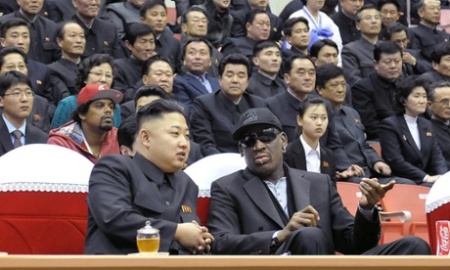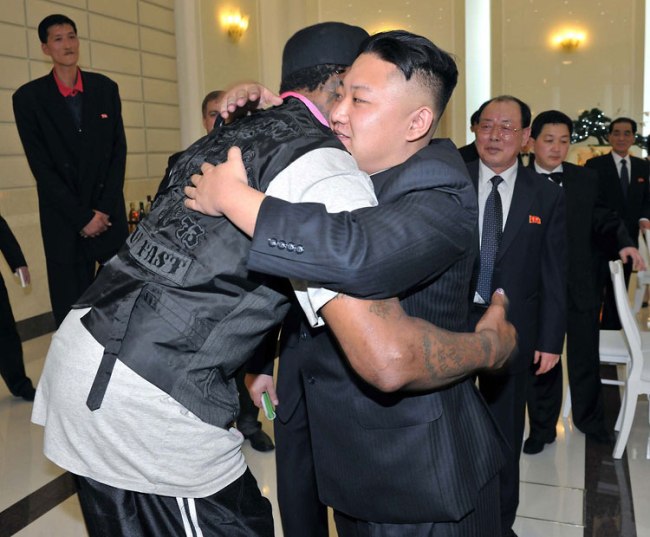The Dictator and Dennis: The Legitimacy of the Celebrity Ambassador
Historically the role of the diplomat has been a vital method of conducting interstate relations. Whether negotiating peace or simply establishing or improving relations between states, the act of diplomacy was once considered an exclusive profession, conducted by only a select few. However with the emergence of the ‘celebrity diplomat’, it appears that anyone with a relatively acknowledgeable profile can influence diplomatic efforts and global politics.
In today’s world of entertainment fascination and media subjugation, it is unequivocally obvious that celebrities can have a powerful impact in society. Whether influencing our choices in fashion or hobbies, the fascination people have in celebrity culture has a profound effect on their decisions. However the impact these individuals have on the progress of political and diplomatic initiatives are less certain. With former NBA star Dennis Rodman’s trip to both North Korea in March representing one of the latest incidents of celebrity dabbling in current affairs, the question of whether A, B or even C-lister missions actually legitimise global issues continues to be raised.
This concern for celebrities’ involvement in certain issues is nothing new. In the past previous ‘goodwill ambassadors’ have attracted a certain amount of controversy by acting in contradiction to the very causes they were promoting. The UN’s decision to seek the help of Geri Halliwell or ‘Ginger Spice’ as a comparatively short-time advocate of family planning for example, has often been considered a particular blunder.[1]
However the relative success of the past should also be considered. The pioneering decision to convince the likes of Danny Kaye and Audrey Hepburn as the first famous goodwill ambassadors for UNICEF proved to be a great success as Hepburn dedicated her rest of her post-acting life to raising awareness for impoverished children throughout third-world nations.[2]
With regards to Rodman’s trip to North Korea (publicised by Vice Media as “the beginning of dialogue with North Korea”[3]) and previous celebrity contact with regimes, these goodwill missions have also been viewed as controversial. For example while Sean Penn’s individual decision to visit Baghdad “to seek a greater understanding of Iraq’s supposed WMD programme”[4]was highly publicised and prompted support for increased investigations, the Bush administration launched the invasion regardless.
So, what to make of the curious case of Dennis Rodman… Could the greatest rebounder in the NBA be a celebrity activist responsible for quelling Kim Jong-un and his nuclear proliferation policy, or is this man simply trying to seek the limelight with another episode of somewhat bizarre behaviour?
Naturally, there are two distinctive views on Rodman’s foray. Recently highlighted by The New York Times’ blog Does Diplomacy Need Star Power?,[5] the two sides of the debate falls into two categories; 1) those who think celebrity involvement in celebrity-state missions such as Rodman’s does not guarantee any lasting improvements in state to state relations and 2) those who believe celebrity diplomats have a unique opportunity to visit individuals and isolated states where conventional diplomatic authorities would rather avoid.
Voicing his concern for Rodman’s ineptitude with The New York Times’ blog Robert Loftis, a former United States Foreign Service officer believes that self-appointed celebrity diplomats has little impact. Stating that Rodman’s new found friendship with North Korea’s Supreme Leader “did absolutely nothing to prevent him from dangerously escalating his rhetoric and raising the chances of miscalculation”,[6] Loftis believes that celebrity ambassadors (particularly in Rodman’s case) do not have a full understanding of the what their undertaken mission actually mean.
However celebrity diplomacy theorist Andrew Cooper believes there may be more to Rodman’s ‘antidiplomatic’ profile. Admittedly, the former basketball star’s knowledge and awareness of the trials and tribulations facing North Korea and her citizens appears to be somewhat minimal. However the fact remains that Rodman has achieved something previous thought impossible: a face to face conversation with a Korean dictator.
Through this relationship based on love of basketball, Cooper speculates as to whether Rodman’s surprising ‘basketball diplomacy’ “could be the equivalent of the highly influential Ping-Pong diplomacy between China and the U.S. in the 1970s”.[7]
Who knows? Maybe the key to establishing new state to state relations with one of the most secretive nations on the planet is the common ground of basketball. Currently Mr Rodman is tapping into this friendship to ask for the release of Kenneth Bae, a Korean-American man sentenced to 15 years hard labour. Whether this proves to be a success or not is yet to be established. One thing that has been established: even tyrannical dictators love basketball.
[1] Tsaliki, L. Frangonikolopoulos, A. and Huliaras, A. 2011. Transnational Celebrity Activism in Global Politics: Changing the World? (Bristol: Intellect Publishing) p57
[2] UNICEF, “Audrey Hepburn: UNICEF People” http://www.unicef.org/people/people_audrey_hepburn.html (May 2013)
[3] The Guardian, “Dennis Rodman: a new breed of celebrity ‘anti-diplomat’” 6th March 2013. http://www.guardian.co.uk/commentisfree/2013/mar/06/dennis-rodman-north-korea-celebrity-diplomat (May 2013)
[4] BBC News, “Sean Penn urges peace with Iraq”. 16th December 2002. http://news.bbc.co.uk/1/hi/world/middle_east/2577981.stm (May 2013)
[5] The New York Times. “Does Diplomacy Need Star Power?” 17th March 2013. http://www.nytimes.com/roomfordebate/2013/03/17/do-celebrity-ambassadors-like-dennis-rodman-make-a-difference (May 2013)
[6] The New York Times. “Does Diplomacy Need Star Power?: Diplomacy Isn’t About Friendships” 17th March 2013. http://www.nytimes.com/roomfordebate/2013/03/17/do-celebrity-ambassadors-like-dennis-rodman-make-a-difference/dennis-rodman-diplomacy-isnt-about-friendships-its-about-persuasion (May 2013)
[7] The New York Times. “Does Diplomacy Need Star Power?: Where Diplomats Fear to Tread” 18th March 2013. http://www.nytimes.com/roomfordebate/2013/03/17/do-celebrity-ambassadors-like-dennis-rodman-make-a-difference/dennis-rodman-where-diplomats-fear-to-tread (May 2013)


